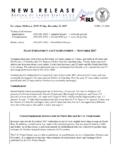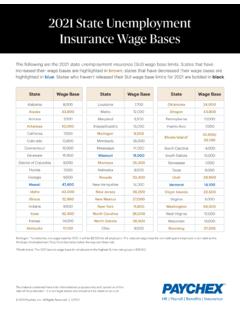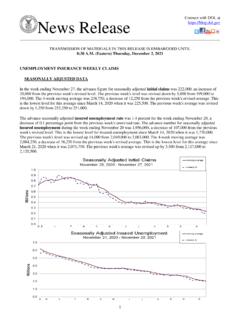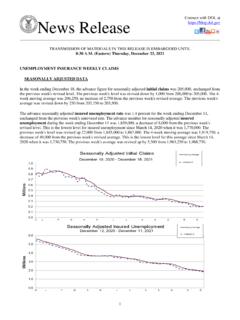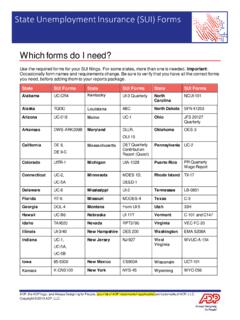Transcription of What Is the Cause of Graduates’ Unemployment? Focus on ...
1 Journal of Educational Issues ISSN 2377-2263 2017, Vol. 3, No. 2 1 What Is the Cause of Graduates unemployment ? Focus on Individual Concerns and Perspectives Youngsik Hwang (Corresponding author) Higher Education & Student Affairs, indiana University 107 S indiana Ave, Bloomington, IN 47405, USA Tel: 1-812-318-4072 E-mail: Received: June 12, 2016 Accepted: July 24, 2017 Published: August 1, 2017 URL: Abstract The graduate unemployment rate is one of the current issues being discussed by higher education scholars.
2 College students spend their time and money in order to receive educational advantages unavailable to high school graduates. So if they face unemployment , they are more vulnerable to unfavorable economic conditions because they have already spent their resources pursuing higher education. This paper examines the reasons why college graduates are facing unemployment in the competitive market. There are several factors that explain their unemployment status, and this paper identifies each component at an individual level. With specific analysis of the unemployment phenomena, this paper provides direction for further research.
3 Keywords: Higher education, Graduates, unemployment 1. Introduction The main goal of higher education has been focused on college access for college-aged students and gaining more admission for minority students. However, recently the target has moved toward achieving more successful college completion rate during President Obama s tenure. As a result, postsecondary education institutions are required to meet more diverse needs from emerging student cohorts like non-traditional students. Meanwhile, students pursue higher education for different educational objectives, and students select institutions for various reasons (Bastedo & Gumport, 2003).
4 Among these diverse purposes, economic perspectives emphasize the importance of educational outcomes after graduation based on future income. With the belief that more education reduces the possibility of unemployment , Brunello (2001) argues the role of higher education is as a training center for future workers. Bridgstock (2009) explains that elements of training college students for future employment Journal of Educational Issues ISSN 2377-2263 2017, Vol. 3, No. 2 2include career management, employability, and discipline-specific skills. Despite this training, students sometimes delay graduation, and Arkes (2010) argues the reason for this extended schooling is fear of unemployment due to poor economic conditions.
5 College students normally attend their institution and graduate within a certain time frame. While graduates want to have acceptable incomes based on return of investment, they sometimes face unemployment after graduation. unemployment is detrimental to the individual because it leads to financial deficits based on college debts and educational expenses. If graduates do not have the skills to meet the needs of employers, then the unemployment rate will increase unnecessarily. This study shows how graduates deal with unemployment and how they escape from it.
6 While offering several policy suggestions, the following section describes graduate unemployment as a whole and interprets its related components. 2. Conceptual Framework Higher education plays a critical role in training future community members based on social demands. After finishing their college education, graduates expect they will find a higher valued job compared to those of high school graduates, and the extension of unemployment has a negative effect on the wellbeing of individuals (Winkelmann, 2009). The fear of unemployment influences how students plan for their careers because college students sometimes consider studying beyond their senior year, and they tend to select majors in the natural sciences, rather than in the humanities or other social sciences (Bedard & Herman, 2008; Gerardi, Herkenhoff, Ohanian, & Willen, 2013).
7 Thus graduates find themselves in a complicated decision-making process influenced by diverse external environmental factors. These factors include market conditions, issues of over-education, individual perspectives, and employable skills and abilities. College students preparing for graduation are affected by these components when planning for their career, networking and collecting useful information about the employment market (Cai, 2013). However, two students who select the same major will not necessarily have the same job opportunities, and their expected returns after graduation may also differ (Carnevale & Cheah, 2013).
8 In this aspect, college students are required to be more careful in preparation in order to lessen risk of unemployment in the future. Although those who are more educated have more opportunities related to job searching, training, and information, college graduates are still struggling to survive in the job market (Cairo & Cajner, 2016). Market Condition: How the Market Affects Graduate unemployment High school seniors decide whether or not they will attend college based on their desired career path. When students consider their college education, they cannot always accurately predict their career paths, and so they rely on information from sources such as parents, teachers, peer-groups.
9 Under this uncertainty, the students select their institution with the expectation of high financial return after graduation, and they spend educational expenses during college life. These expectations correlate with reality more often during a period of economic boom, when the market requires more workers to be hired in order to produce additional output, and higher education institutions play a role in providing well-trained Journal of Educational Issues ISSN 2377-2263 2017, Vol. 3, No. 2 3future labor forces at that time.
10 However their expected returns may not be satisfied during an economic recession, when workers are laid off (Shapiro, Dundar, Wakhungu, Yuan, Nathan, & Hwang, 2016). Nevertheless, the re-employment rate of educated workers is still higher than that of their less-educated counterparts (Riddell & Song, 2011) Through the education system, people can acquire useful employable skills that can help them overcome the unfavorable market conditions (Rae, 2010; Naong, 2011; Mbah, 2014). Thus students who are facing uncertainty during economic recession reconsider their future career path to meet flexible environment (Chen, Kannan, Trehan, & Loungani, 2011).












